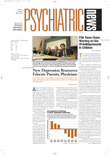Over the past decade, APA has published 14 practice guidelines using an evidence-based process. After some initial concerns about “cookbook medicine” and the possibility of increased malpractice actions, neither of which have materialized, psychiatrists have increasingly accepted the guidelines as an aid in making clinical decisions.
There have been three major challenges in the project: (1) developing a reliable and effective process that incorporates the relevant evidence in a usable form, (2) disseminating the guidelines and having them used in day-to-day clinical work, and (3) keeping the guidelines current.
Development process: The process we developed for producing practice guidelines is based on an Institute of Medicine report and criteria developed by the American Medical Association. The process includes development by expert work groups, a systematic review of evidence and the development of evidence tables, broad review and iterative revisions, and approval by the APA Assembly and Board of Trustees.
The Assembly and the Board have been very attentive to guidelines and have made many substantive contributions to the content of individual guidelines and to the process. Under the guidance of the devoted Steering Committee on Practice Guidelines and a very effective APA project staff, the development process has become almost automatic, with high acceptance from APA leaders and other members. A challenging aspect of this work has been struggling with the nature of evidence and how to develop recommendations in areas where the evidence, at least as represented by randomized controlled trials (RCTs), is spotty or nonexistent. A humorous article in the December 2003 British Medical Journal pointed out the fallacy of relying exclusively on RCTs by noting that there has not been an RCT on the effectiveness of parachutes in saving lives. Waiting for such a study before using parachutes does not seem like a good idea!
Dissemination: Throughout medicine, effective dissemination of guidelines has been a major challenge. Many well-developed guidelines are available, but their use by physicians in practice remains low. Each APA guideline is published in the American Journal of Psychiatry. In addition, each guideline is posted on the APA Web site at<www.psych.org>, and a summary of the guideline is included in the federal Agency for Health Care Research and Quality's guideline clearinghouse site, with a link to the APA site. Also, every two years, a compendium of all APA practice guidelines, including the most recent revisions, is published by APPI. Actually, the iterative development process and the reality that about 800 members have reviewed various drafts of each guideline helps significantly with dissemination efforts.
Quick-reference guides have been published that present the recommendations in algorhythmic and bulleted format, and these guides will soon be available for handheld PDAs. Pocket cards are also being developed. Continuing medical education courses focusing on the guidelines are available, and increasingly the guidelines are being incorporated into residency training programs. Questions from the guidelines are included in PRITE examinations, and the guidelines are a major source for ABPN certification and recertification examinations.
Keeping guidelines current: As the explosion of new knowledge in our field continues, it is essential that practice guidelines be kept current. The APA guideline process aims to revise each guideline within five years of publication. To date, four guidelines have been revised, and revisions of four others are in the pipeline.
An article in the September American Journal of Psychiatry suggested that recent evidence would lead to a recommendation different from that identified in the APA Practice Guideline on Bipolar Disorder, published in 2002. To deal with such issues between major revisions of the guidelines, the Steering Committee on Practice Guidelines recently agreed on a solution:“ Guideline Watches.” Watches are brief updates that identify new findings that should be considered when using a guideline. The watches are written by experts associated with the development of the particular guideline and are approved by the executive committee of the project but not by the Assembly or Board. Hence they are not APA policy statements. Watches have been published for Alzheimer's disease, psychiatric evaluation, and delirium, and four more are in development—for major depressive disorder, panic disorder, borderline personality disorder, and bipolar disorder. Each watch is published online at the APA Web site and will be included in each two-year compendium. We are also exploring other means of disseminating the watches. For example, the watch on major depressive disorder is expected to be included in the next issue of Focus, APA's continuing education journal.
Practice guidelines can be an aid to psychiatrists in their clinical work with patients. However, for that to occur, the process of the guideline development must be thoughtful and rigorous, and the recommendations must reflect current evidence and clinical consensus. The Guideline Watches should be helpful in meeting that challenge. ▪

